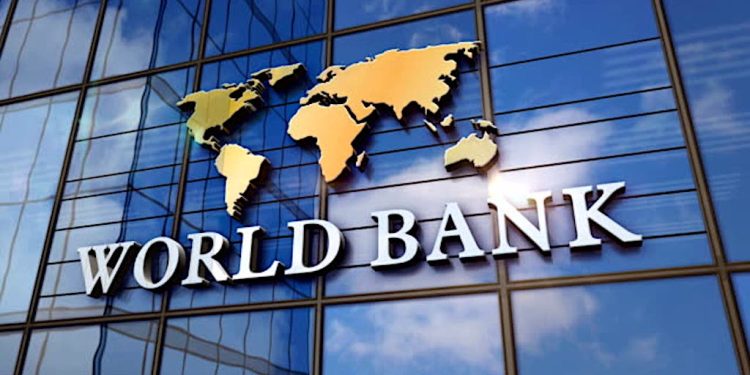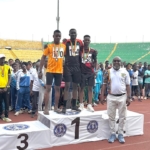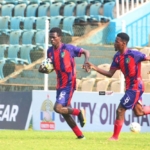
World Bank on glass building. Mirrored sky and city modern facade. Global capital, business, finance, economy, banking and money concept 3D rendering animation.
The World Bank’s reversal of its loan ban on Uganda—despite the country’s discriminatory policies—highlights the delicate balance between economic development and human rights in global policymaking. The decision comes two years after the Bank halted new loans to the East African country, following Uganda’s passage of one of the world’s harshest anti-LGBTQ+ laws.
Uganda enacted the draconian law in 2023, introducing capital punishments, including the death penalty, for certain same-sex acts. Following its passage, international human rights organisations—including Uganda’s Human Rights Awareness and Promotion Forum (HRAPF)—documented widespread violence, hundreds of evictions, and mass arrests of LGBTQ+ individuals. HRAPF alone recorded over 500 cases of human rights violations in the first few months after the law’s enactment.
Now, the World Bank has made a significant U-turn, lifting the loan freeze. The Bank claims that new “mitigation measures” will ensure its funding does not harm or discriminate against LGBTQ+ people. This decision raises pressing questions—particularly for other African countries grappling with similar anti-LGBTQ+ legislation. Uganda is one of several African nations, including Ghana and Kenya, currently navigating their own controversial bills.
The World Bank’s Role in Development and Criticisms
As one of the world’s largest multilateral financial institutions, the World Bank provides loans and grants aimed at reducing poverty and promoting inclusive growth. In low- and middle-income countries like Ghana, its financing supports development initiatives across sectors such as infrastructure, education, and health.
In Ghana, for instance, the Bank funds the government’s Livelihood Empowerment Against Poverty (LEAP) cash transfer programme, which covered over 350,000 households as of December 2023. It has also supported water and sanitation projects and the Ghana Economic Transformation Project to boost private sector-led growth.
However, the World Bank and its partner institution, the International Monetary Fund (IMF), have faced consistent criticism. Many economists argue that their lending models can foster long-term dependency and hinder sustainable growth, often through stringent loan conditions or “structural adjustment” policies.
Notably, the World Bank’s suspension of lending to Uganda in August 2023 was a serious financial blow—it halted one of the country’s most vital sources of infrastructure finance. UK-based charity Open for Business estimated that Uganda lost between $470 million and $1.7 billion in foreign aid and investment in the year following the law’s enactment, illustrating the immense influence of global financial institutions.
Uganda’s Stance and the Mitigation Debate
The Ugandan government defends its anti-LGBTQ+ law, asserting that it reflects the conservative values of its people and protects traditional family structures. In May 2023, Information Minister Chris Baryomunsi insisted the law was not “targeting or discriminating against anyone” but rather regulating public promotion and behaviours deemed contrary to cultural norms.
Human rights groups, however, condemn the law as discriminatory and harmful. Oryem Nyeko, a Human Rights Watch researcher, described it as a political distraction from Uganda’s deeper issues such as corruption and economic hardship.
The World Bank has stated that its renewed engagement with Uganda includes “mitigation measures” to protect LGBTQ+ individuals in Bank-funded projects. In an August 2024 press release, the Bank affirmed, “We cannot deliver on our mission of ending extreme poverty and promoting shared prosperity unless all people can participate in, and benefit from, the projects we finance.”
However, many experts are sceptical. Critics argue that these safeguards may be more symbolic than practical, especially in countries where local authorities enforce anti-LGBTQ+ laws. How, they ask, can non-discrimination be guaranteed when national law fundamentally conflicts with such values?
For example, in a World Bank-funded health project, how can LGBTQ+ people be assured of equal treatment if local enforcement still criminalises them? This dilemma raises broader concerns about the Bank’s ability to uphold human rights standards in politically complex environments.
Beyond the World Bank, other international actors have also responded to Uganda’s legislation. Several bilateral donors have condemned the law, and some have suspended aid or imposed travel restrictions.
Ghana’s Legislative Trajectory and Constitutional Realities
Ghana has seen its own push to restrict LGBTQ+ rights. In February 2024, Parliament passed the Human Sexual Rights and Family Values Bill, which would criminalise LGBTQ+ identity with up to three years in prison, and impose even harsher penalties—up to five years—for promoting or funding LGBTQ+ groups.
Former President Nana Akufo-Addo refused to sign the bill into law, citing active Supreme Court petitions. In March 2025, some MPs reintroduced the bill, hoping to push it through.
President John Dramani Mahama has voiced opposition to some provisions but has supported the bill’s underlying principles. He has called for it to be introduced as a government-sponsored bill—rather than a private member’s bill—to ensure it can withstand constitutional scrutiny.
Ghana’s 1992 Constitution protects various fundamental rights, including freedom of speech (Article 21(1)(a)), assembly (Article 21(1)(d)), and non-discrimination (Article 17(2)). Yet LGBTQ+ Ghanaians often face societal rejection, discrimination, and violence. Human rights groups argue the bill violates Ghana’s own constitution and its international human rights obligations.
UN High Commissioner for Human Rights, Volker Türk, described the bill as “profoundly disturbing” and warned that its passage would contradict Ghana’s legal and human rights commitments under regional and international frameworks.
Economically, the bill could be devastating. Ghana’s Finance Ministry warned in March 2024 that its enactment could jeopardise up to $3.8 billion in World Bank funding and compromise the $3 billion IMF programme essential to stabilising Ghana’s economy.
Implications for African Sovereignty and Human Rights
The World Bank’s decision on Uganda sends a mixed message across Africa. On one hand, it reflects a desire to remain engaged and influential. On the other, it raises concerns about whether the Bank is compromising on its human rights principles.
If “mitigation measures” are enough to restore funding to a country with one of the world’s harshest anti-LGBTQ+ laws, does this set a precedent? Could it encourage other governments to pass discriminatory laws, confident they can maintain international financial support with minimal changes?
For countries like Ghana, this creates a complex calculus. While many citizens hold strong cultural and religious objections to LGBTQ+ rights, their economies remain heavily dependent on international aid and loans.
Critics of the World Bank worry this move rewards Uganda’s government without demanding structural human rights improvements. Supporters argue it maintains a crucial lifeline while quietly influencing policy through conditional engagement.
Human rights defenders face an uphill task. They must continue advocating for marginalised groups, even as global institutions weigh development needs against rights concerns.
The Uganda case offers a revealing lens into how international finance and domestic politics intersect. It will likely influence legislative and civil discourse across the continent.
Conclusion
The central question remains: can economic engagement truly mitigate human rights abuses embedded in national law? Or does it inadvertently legitimise such laws by enabling continued financial support?
How African governments respond to this dilemma—balancing state sovereignty, cultural identity, and universal human rights—will shape not just their domestic futures, but their standing in a global community increasingly attentive to both rights and development.
DISCLAIMER: The Views, Comments, Opinions, Contributions and Statements made by Readers and Contributors on this platform do not necessarily represent the views or policy of Multimedia Group Limited.
DISCLAIMER: The Views, Comments, Opinions, Contributions and Statements made by Readers and Contributors on this platform do not necessarily represent the views or policy of Multimedia Group Limited.
- President Commissions 36.5 Million Dollars Hospital In The Tain District
- You Will Not Go Free For Killing An Hard Working MP – Akufo-Addo To MP’s Killer
- I Will Lead You To Victory – Ato Forson Assures NDC Supporters
Visit Our Social Media for More




